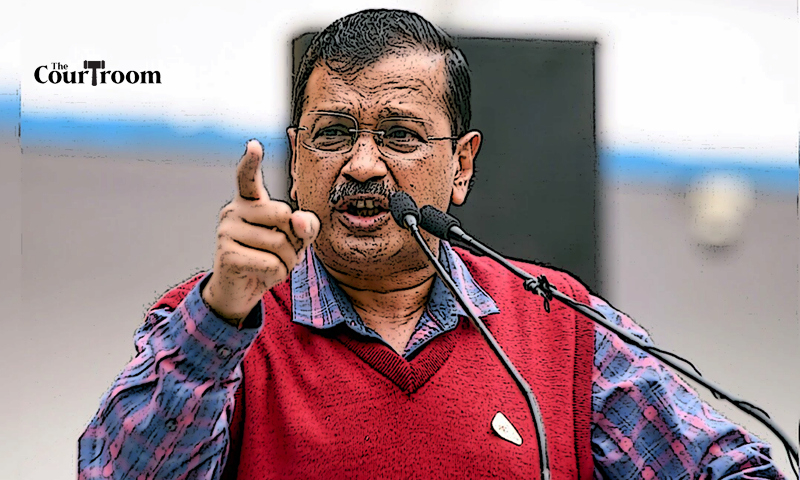Delhi High Court Denies Interim Protection to Arvind Kejriwal in Money Laundering Case
The Delhi High Court on Thursday declined to issue orders granting interim protection from coercive measures to Chief Minister Arvind Kejriwal at this juncture in the money laundering case pertaining to the alleged liquor policy issue.
“We have heard arguments from both parties. However, at present, we are not inclined to issue any orders,” remarked a division bench consisting of Justice Suresh Kumar Kait and Justice Manoj Jain.
Nevertheless, the bench allowed the Enforcement Directorate (ED) the opportunity to respond to Kejriwal’s plea seeking interim relief, which is part of his larger petition contesting the summons issued to him by the central investigative agency in the money laundering case.
Senior Advocate Abhishek Manu Singhvi represented Kejriwal, while ASG SV Raju, along with special counsel Zoheb Hossain, appeared for the ED.
The court had previously sought the ED’s stance on the maintainability of Kejriwal’s plea challenging the summons and had scheduled the case for a hearing on April 22.
During the recent hearing, Singhvi argued that the ED was unfairly creating an uneven playing field at this stage, especially with elections approaching, and asserted that the summons failed to specify the capacity in which Kejriwal was required to appear.
“The sole intention appears to be: ‘Come to my parlour. Skip the coffee. I’ll arrest you… What more information do you require? I’ll provide it,” Singhvi remarked.
Singhvi further insisted that the ED must justify the need for an arrest, as its authority should not be seen as a blanket license to exercise power whenever deemed fit.
He criticized the ED’s actions as politically motivated, attributing them to the impending elections.
In contrast, Raju opposed granting interim relief and argued that Kejriwal must abide by the law, emphasizing the equal application of the law to all individuals, whether Chief Minister or common citizen.
Responding to the court’s query, Raju clarified that Kejriwal had been summoned in his personal capacity, not as Chief Minister or Aam Aadmi Party Chief.
He maintained that there was sufficient evidence to justify Kejriwal’s interrogation.
In a subsequent session, ASG SV Raju contended that Kejriwal’s application could not be entertained as the maintainability of his primary petition was in question. He characterized the application as “mischievously moved.”
Raju argued that addressing the application would prematurely advance the hearing date of the primary petition, particularly given the issue of maintainability.
“We haven’t explicitly mentioned arrest. We’ve summoned him for interrogation. We might arrest him. We might not. It’s Kejriwal’s imagination that the Aam Aadmi Party will be implicated,” Raju stated.
He emphasized that neither the Aam Aadmi Party nor Kejriwal were accused in the case, rendering the quashing of the FIR or the case baseless.
Singhvi countered that Kejriwal’s involvement could only be conceptualized as the convenor of the Aam Aadmi Party.
“Unless the intent is to harass and level the playing field in the interest of democracy and fair elections… there can be no other objective,” Singhvi asserted.

Yesterday, the ED had opposed the issuance of a formal notice on the petition, arguing that it was not maintainable and requesting time to respond on the matter of maintainability.
Singhvi, however, maintained that Kejriwal was not evading the summons and would appear if provided protection and a “no coercive steps” order in his favor.
The court had earlier suggested to Singhvi that Kejriwal appear in response to the summons, asserting that only then could it be determined whether he was being summoned as an accused or a witness.
In addition to contesting the summons, Kejriwal’s plea aims to challenge the constitutionality and arbitrariness of Section 2(s) of the Prevention of Money Laundering Act (PMLA), particularly regarding its interpretation to encompass a political party within its scope.
The plea argues that the ED cannot assume that a “political party” falls under the definition of “artificial juridical person” in Section 2(1)(s) of the PMLA. Consequently, the issuance of summons to office bearers of political parties under Section 50 of the Act is deemed illegal, arbitrary, and unreasonable.
Regarding the ongoing controversy, the ED had filed two criminal complaints against Kejriwal in the Rouse Avenue Courts in the city, alleging non-compliance with the summons. To date, the Chief Minister has received nine summonses from the central probe agency.
Last week, Kejriwal appeared before the ACMM court and was granted bail upon furnishing a bail bond of Rs 15,000 and a surety of a similar amount. The matter is scheduled for further hearing on April 01.
The ED alleges that the excise policy was implemented as part of a scheme to provide a 12 percent wholesale business profit to specific private companies, despite this stipulation not being mentioned in the minutes of Group of Ministers (GoM) meetings.
Furthermore, the agency claims that a coordinated conspiracy was orchestrated by Vijay Nair and others, including the South Group, to provide exceptional profit margins to wholesalers.
According to the agency, Nair acted on behalf of Chief Minister Arvind Kejriwal and Manish Sisodia.


